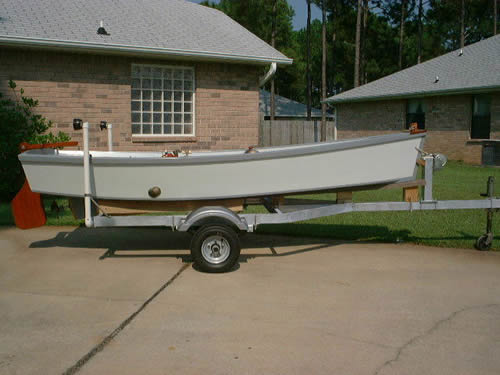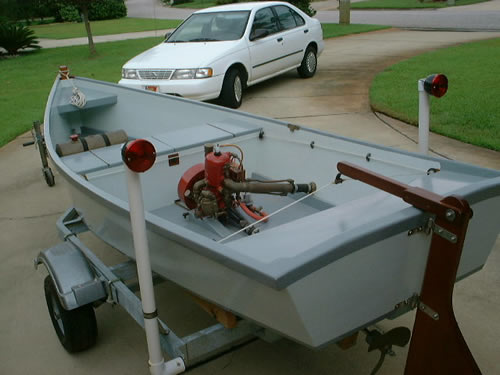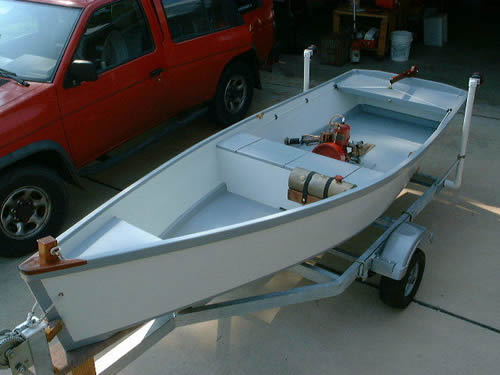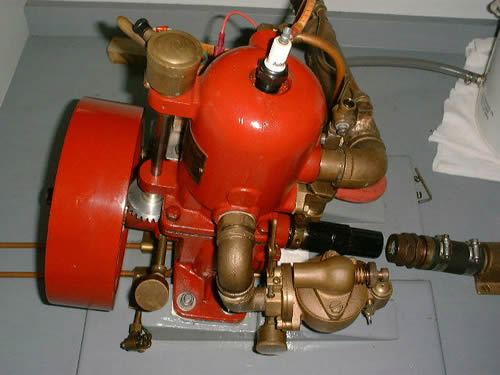| Author |
Message |
    
andrew
Moderator
Username: andrew
Post Number: 1122
Registered: 11-2001

| | Posted on Tuesday, April 05, 2005 - 06:51 pm: | 




|
Arthur Donaghy sent in some nice pictures of a small inboard powered boat he has:
quote:Boat is 11 1/2ft X 4ft - Marine ply bottom, cypress sides and trim, mahogany rudder & tiller.
Engine is 1 1/2hp, one cylinder two cycle water cooled, weight about 50lbs, spark plug ignition (buzz coil), flywheel 9 1/4" diameter X 2 3/4" thick, Schebler carburetor, all brass fittings including gas tank.
Engine sold by Fairbanks Co. but made by another company possibly Detriot Auto Marine or Strelinger Marine Engine Co. Engine



 |
    
jb_castagnos
Senior Member
Username: jb_castagnos
Post Number: 234
Registered: 07-2002
| | Posted on Tuesday, April 05, 2005 - 07:31 pm: | 




|
I see you found a small engine Arthur, nice looking rig. When will it hit the water?
J.B. |
    
solarrog
Senior Member
Username: solarrog
Post Number: 153
Registered: 03-2002
| | Posted on Tuesday, April 05, 2005 - 07:43 pm: | 




|
Wow this certainly is a boat and motor you can be proud of
Rog |
    
billschaller
Senior Member
Username: billschaller
Post Number: 132
Registered: 12-2003
| | Posted on Wednesday, April 06, 2005 - 08:25 am: | 




|
same engine as my detroit. |
    
richarddurgee
Senior Member
Username: richarddurgee
Post Number: 737
Registered: 11-2001

| | Posted on Wednesday, April 06, 2005 - 09:59 am: | 




|
Arthur
Some time before 1904 this engine was brought on the market by the "Detroit-Lackawanna Co". In 1904-05 The name was changed to the "Detroit Auto=Marine Co".They were located at 82 East Congress Street in Detroit. These engines had lever controlled timers, the little 1 Hp with lever behind the flywheel and all others a short handled lever at rear of engine on the output shaft.
1907 the name changed again to the "Detroit Gas Engine & Machinery Company.The shaft driven timers were then used, and the trade name for the engine was "Major". That same year the business and all assets were sold to the "Strelinger Marine Engine Co" 110 Bates Street in Detroit.My history here gets hazy, don't know if engines were still being mfgrd and sold through Fairbanks and if so for how long or whether fairbanks bought the existing engine inventory ? The Strelinger was a very different engine and was not affected in design by this buy out, but you are quite right about the engine being a Detroit-Strelinger !!
Great looking boat and motor ! |
    
miro
Senior Member
Username: miro
Post Number: 167
Registered: 11-2001
| | Posted on Monday, April 11, 2005 - 11:33 am: | 




|
Art - it is nice to see that you're up and running (soon) - are you comming to Calvert this year?
miro |
    
Bob in Wisconsin
Visitor
| | Posted on Thursday, October 06, 2005 - 01:51 pm: | 




|
Is it possible to see the connection through the boat for the drive shaft. I am currently restoring a 18' Thompson rowboat given me and I have a Dubrie engine, detroit transmission, and the propeller. Have not figured out how to get the drive shaft properly through the bottom yet. Thanks in advance for any guidance. |
    
richardday
Senior Member
Username: richardday
Post Number: 461
Registered: 11-2003

| | Posted on Thursday, October 06, 2005 - 08:47 pm: | 




|
Bob, Keep in mind the prop size has to be about the size the maker reccomended to keep the upper engine speed at the makers reccomended upper RPM.
These props tended to be square that is had a pitch equal to the diameter or even a little more pitch. The prop apperture under the stern of the boat should not be much less than your fist. This is to avoid errosion of the hull and unpleasant pounding on the hull. This will of couse dictate the shaft angle through the bottom of the boat. For small boat such as yours the practice was to build up the wooden portion housing the prop shaft from two pieces. One approach the shaft log might be 2" wide and a 1" dia. shaft passage would be cut on a table saw to the depth a little over 1/2 of the dia. of the prop shaft. A second piece that would mate with the first would be cut the same way. This avoids the impossible task of boring a 3 or 4 foot hole for the shaft. The two pieces are joined by bronze threaded rods drilled along side the shaft alley. Not an easy job as the depth of the hole gets longer near the stern of the shaft log. Some builders would route the two holes and come up with a round rather than square hole in the shaft log. Other builders would use the same principle but have the two halfs of the cut on the face rather than the top. With the invention of real water proof glue these techniqes really took off as a reliable way to create the shaft log and have it stand up to immersion in water.
Some would line the prop tube with a copper pipe set in molten wax to seal the wood from water leakage. Best I can suggest. |
    
ratrodz
New member
Username: ratrodz
Post Number: 1
Registered: 01-2018
| | Posted on Sunday, January 13, 2019 - 11:44 am: | 




|
I currently own this skiff and motor. Would like to hear from builder and Fairbanks Marine owners.
Bob Huff, [email protected], 434-996-1147}} |
    
spring
Senior Member
Username: spring
Post Number: 58
Registered: 06-2018
| | Posted on Sunday, January 13, 2019 - 07:49 pm: | 




|
Immaculate! Very nice!
Cheers! |


